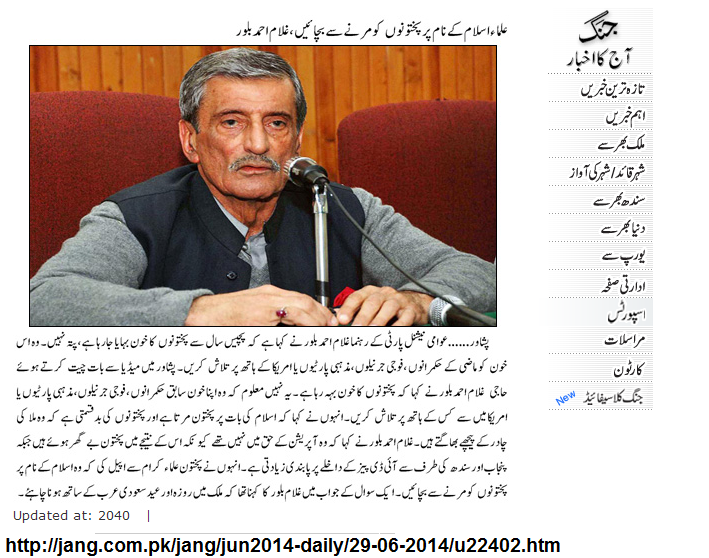Dilemma of two identities facing Pashtun intelligentsia – by Abdul Nishapuri
I don’t contest that Pashtuns are the most suffered ethnic group in Pakistan particularly since late 1970s due to the so called Afghan Jihad, increasing Deobandi and Salafi radicalization of their youths and the post-9/11 war on terror. Also, I don’t contest the imperialist role played by the CIA, ISI and Saudi Arabia in using Pashtun Deobandi clerics, madrassahs, intellectuals and politicians as pawns to promote their own strategic objectives. However, my concern pertains to the lack of Pashtun ciritcal self-reflection in the profitable and willing participation of at least some Pashtuns in the regional and global Jihad project. I am also concerned that some Pashtuns are unwilling or/and unable to differentiate between their centuries old ethnic identity (Pashtun) and relatively new faith identity (Deobandi) given that more than 90% of Pashtuns (except those in parts of Kurram, Hangu and Kohat) happen to be Deobandi, a semi-Salafi puritanical ideology.
Often in their articles, facebook statuses and comments, Pashtun nationalist friends (of Deobandi Islamist or secular liberal leanings) freely amalgamate their ethnic and faith identities. It is my considered view that Pashtun nationalist friends can either own and defend their Pashtun identity or Deobandi identity. Trying to own and defend both is ideologically impossible and historically naive.
Amalgamation of Pashtun and Deobandi identities is not only an exclusive and discriminatory approach (it wipes out Sunni Barelvi, Shia and non-Muslim Pashtuns), it also deprives Pashtun intellectuals of critical self-reflection, forcing them to resort to silence or obfuscation on issues such as the Deobandi-Saudi nexus and genocide of Sunni Sufis and Shias at the hands of Deobandi terrorists (of Pashtun and Punjabi backgrounds). To a lesser extent, the recurring and divisive issue of Mufti Popalzai’s moonsighting and arguments in Popalzai’s defence by Pashtun activists too fall in the same category.
That’s exactly why Pashtun intellectuals have been, largely, unable to develop and present a coherent discourse and response to the Deobandi and Salafi radicalization and violence that Pashtuns of Pakistan and Afghanistan have been facing, particularly since late 1970s.
Blaming the outsiders (Punjabis, Arabs, Chechens, Americans etc) offers only a part of the story. The story remains incomplete in the absence of critical self-reflection within Pashtun intelligentsia about their own identity, its past, present and future.









from facebook:
https://www.facebook.com/AbdulNishapuri/posts/897242693625899
Saleem Asmi: The Pashtun identity was twisted and corrupted by the Afghan War debris that engulfed their entire region. In addition, the government’s ‘strategic depth’ dream and the Saudi petro-dollars further damaged that identity. I think the only way left for the right-thinking Pashtuns is to bring together all non-Deobandi forces and re-learn Bacha Khan’s teachings of nationalist pride and tolerance.
Abdul Nishapuri: Saleem Asmi, I agree. Ironically, Bacha Khan himself made an error of judgement and played a role in setting up Deobandi seminaries in Pashtun lands.
The onus now is on his children and followers to purge ANP and Pashtun lands of this violent ideology thus reviving essence of Bacha Khan’s secular teachings of nationalism and tolerance.
Saleem Asmi: The days you refer to were different. Bacha Khan allowed, even encouraged, Deobandi seminaries because the Deobandis alone were those among Muslims of India who were resolutely nationalistic and in the forefront of the freedom struggle. It was that damned folly called the Two-Nation Theory that upset and mutilated everything.
Abdul Nishapuri : Agreed. However, it begs further probing why the proponents of the TNT lagged far behind in the post-Pakistan year in terms of violence and intolerance exhibited by those who opposed this theory, i.e., Deobandi clerics. Seen in the historical context of violent movements of Shah Ismail and Syed Ahmed Shaheed, I am forced to think that what Deobandis are doing today has an historical pattern. However, this acknowledgement and realization is currently lacking in many Pashtun nationalists.
Saleem Asmi: Let us say it is total perversion all along. Maudoodi remained anti-TNT till the last, and now his party is among its strongest proponents. Similarly, the JUI!
Hermes Evelyne Bag Retail Price http://www.frandestahundcenter.se/api/scripts/166a44152d30419f8a7c9f7683bf75b6.asp
锘縣ow astronauts s Michael Kors Gia leep in space
Marti Michael Kors Cynthia als art equipment is often considered material and can only be carried on a plane as checked baggage and only when declared. This includes stun guns, throwing stars and black jacks. Katanas and other types of swords must be stored in hardcase, locked containers.
I printed off 2 of the tests and excerpts of the information I found and took them in and showed her. She once again said that being depressed is a very serious condition and then questioned if I thought being depressed made me more interesting. She warned me about pop psychology and said that one needs to take a person’s personality into account.
I had to put the mower away for the day, it will be tomorrow on Monday before I can get to it again. Unfortunately, on this 8hp B engine, I believe the solenoid is up under engine cover, as I can see a red wire going up under the cover right near where the starter is located. Is there another method to see if the sta hermes birkin bag size rter works, such as taking a strout wire between the positive battery terminal and the red terminal at the starter?.
http://www.whit-pro.com/
http://techlight.com.ua/
http://trc-kiev.com/index.php/en/
Hermes Kelly Watch Price 2013 http://sandjespersen.dk/db/scripts/ba80761a4a2e499e9062463fd89d92cd.asp